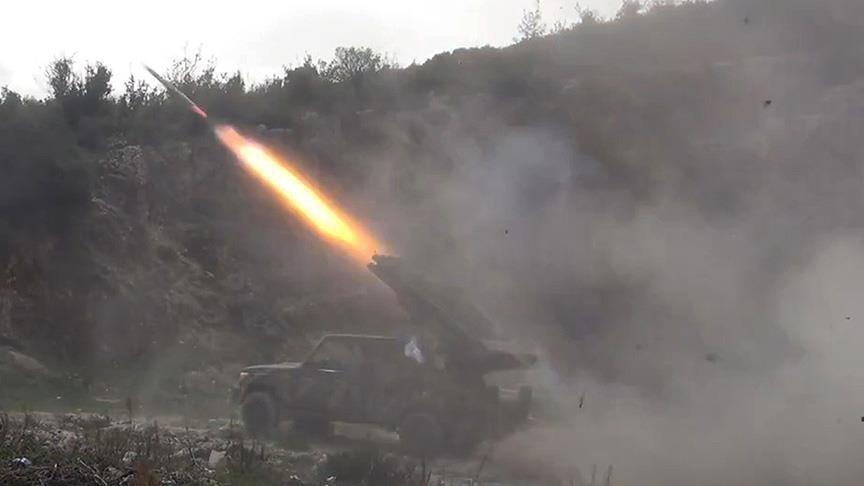Experts assess environmental harm of armed conflict in Yemen
As 7-year conflict rages on, actors' priorities do not lie in environmental services, conservation, expert says

ISTANBUL
As world leaders make remarkable pledges at the Conference of the Parties (COP26) summit to limit the effects of climate change, Yemeni environmental experts shed light on the environmental damage that the war-torn country has suffered.
Environmental engineer Abdullah Sonbul said the continuation of the war for the past seven years has produced many environmental risks.
“Hundreds of thousands of tons of toxic chemical gases released by explosives have had a great damage to the environment, including soil, water, plants and air,” he told Anadolu Agency.
Sonbul said the toxic chemical gases also exacerbate global warming by affecting the Earth's climate, disrupting the structure of the atmosphere that has led to an increase in floods and fires.
Aiming to raise awareness about the damning effects of war and armed conflict on the environment, the UN set Nov. 6, as International Day for Preventing the Exploitation of the Environment in War and Armed Conflict.
Due to high prices, a lack of cooking gas has pushed Yemenis to more traditional methods of cooking using wood, triggering “excessive logging, elimination of a large part of the vegetation cover and compounds the risk of deforestation,” he said.
“Trees are playing a major role in absorbing harmful gases, and without them, the emitted quantities of carbon dioxide into the atmosphere would increase, causing more hazards in a country where the environment takes the least concerns due to bigger armed problems,” said Sonbul.
Absence of authority
Sonbul, who served as hygiene and environment undersecretary in the municipality of the capital Sanaa, said “priorities have changed,” as warring parties have other interests than providing the necessary capabilities and budgets for environmental services.
“The absence of authority all around the country resulted in the interruption of solid waste management in big cities, which led to the accumulation of millions of tons of waste causing the spread of many diseases and the emission of large quantities of methane gas into the atmosphere,” he said.
Eisa Qahtan, a researcher at the Climate Action Network-Arab World, told Anadolu Agency that seven years of war has had harmful effects on environmental sectors including water, agriculture, marine environment and the environmental health sector.
In many cases, heavy rains caused the erosion of agricultural areas, said Qahtan, noting that this was what happened earlier this year in the southwestern district of Jabal Habashi, where the situation could not be salvaged due to the “complete absence of the authorities."
“Authorities have failed to dispose of waste and hazardous materials regularly and properly. They also failed to fix the swamps existing in the streets of big cities for a long time, which led to the spread of many diseases and epidemics,” he said, adding that “turning a large part of the coastal strip of Yemen into military sites and operations" has been another environmental risk.
Possible oil spill
Qahtan referred to the political dispute about a rotting oil tanker, Safer, in the Red Sea as one of the major threats to the marine environment in Yemen and the region.
The oil tanker is a floating storage and offloading vessel that is used as an offshore platform for ships loading crude oil from the Marib-Ras Isa pipeline.
The ship has been moored in the Red Sea since Houthi rebels captured the coastal province of Hudaydah in 2015, amid fears of the possible leak of an estimated 1.1 million barrels of light crude oil, about four times the 260,000 barrels that spilled from the Exxon Valdez in Alaska in 1989.
“Millions of people could be exposed to harmful pollution if an explosion were to occur onboard, with severe health impacts for vulnerable populations,” UN Environment Programme (UNEP) Executive Director Inger Andersen said in a briefing on June 3 to the Security Council.
“An oil spill would have negative effects on the lives of people already going through the worst humanitarian crisis in the world,” she stressed.
In May, Yemen’s permanent delegate to the UN, Abdullah al-Saadi, urged the Security Council to exert maximum pressure on Houthi rebels to “prevent the Safer oil tanker from being used for political extortion and allow the United Nations inspection team to conduct necessary assessments.”
Representatives from France, Britain, and the US have implored the Houthis to grant the UN’s technical team immediate access to carry out necessary assessments or take responsibility against the risk of ecological catastrophe.
The UNEP managed to reach two agreements with the Houthi rebels in July and November 2020 to grant the UN team access to the tanker, but the decisions were never implemented.
There is also the possibility that the oil, if spilled, could drift and affect neighboring coastal countries, including Djibouti, Eritrea, and Saudi Arabia.
On Nov. 5, 2001, the UN General Assembly declared Nov. 6 the International Day for Preventing the Exploitation of the Environment in War and Armed Conflict.
Yemen has been engulfed by violence and instability since 2014, when Iran-aligned Houthi rebels captured much of the country, including the capital, Sana’a.
A Saudi-led coalition aimed at reinstating the Yemeni government has worsened the situation, causing one of the world’s worst man-made humanitarian crises with 233,000 people killed, nearly 80% of the country’s 30 million people needing humanitarian assistance and protection and more than 13 million people in danger of starvation, according to UN estimates.
Anadolu Agency website contains only a portion of the news stories offered to subscribers in the AA News Broadcasting System (HAS), and in summarized form. Please contact us for subscription options.







